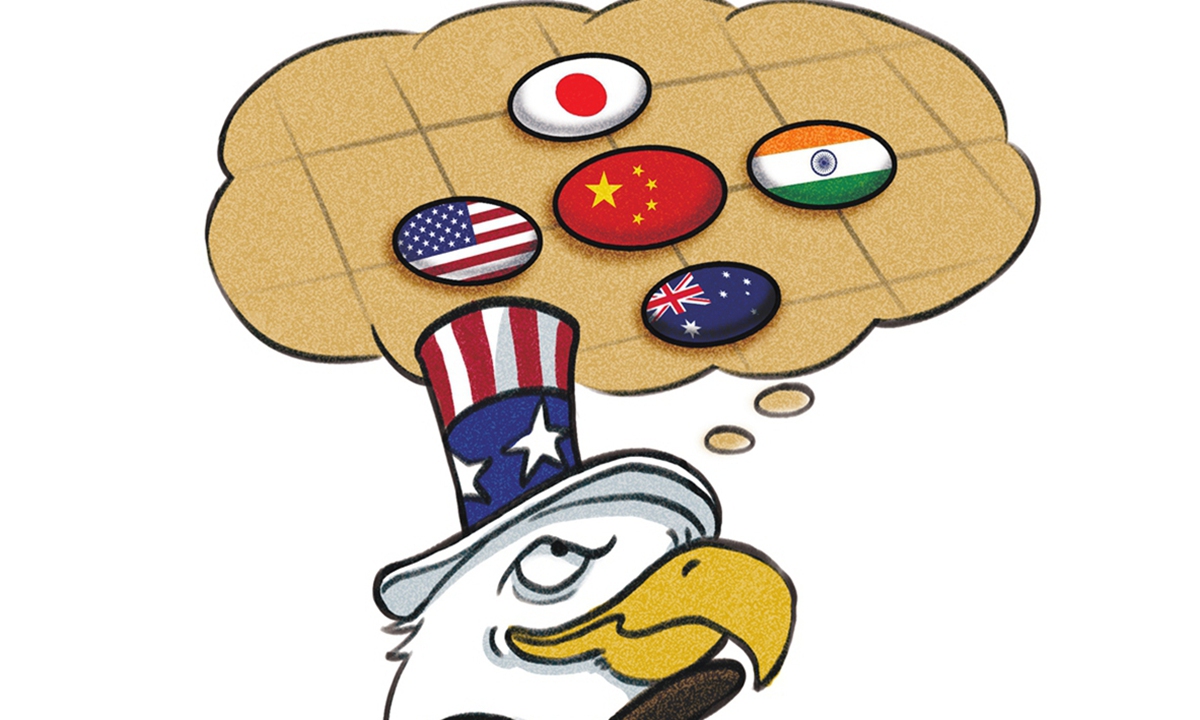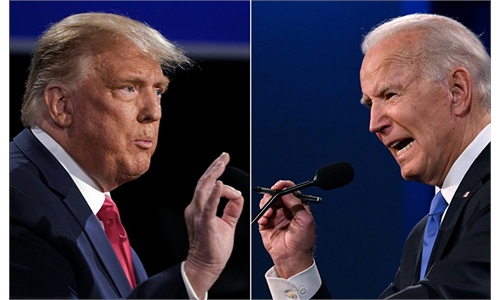
Illustration: Liu Rui/GT
When US former president Barack Obama was still in office, the US began to intensify its strategy in the Asia-Pacific region. US President Donald Trump has upgraded that layout into so-called Indo-Pacific Strategy. Most recently, due to the presidential elections, the Trump administration has emphasized the so-called QUAD mechanism of the US, Japan, India, and Australia. As this trend of seeking increased influence in the Asia Pacific will not change, President-elect Joe Biden is likely to continue it by selling old wine in new bottles - carrying on some of the current administration's policies to neutralize China.
Whereas China is the main competitor of the US, as Biden said, the Biden administration will need a variety of measures to contain the Asian country. These will likely include enhancing military alliances, as well as ties between the US and its allies to maintain the US' hegemony in military and other spheres in the Asia-Pacific region. This is why the US is striving to establish the QUAD mechanism right now.
It is not important whether or not the QUAD will be a formal alliance, but the vision of forging such an alliance is. Because it shows the US' devotion to building a multilateral military mechanism.
If the QUAD is officially established in the Asia Pacific, its targets may include countries like North Korea, Iran, and Russia, in addition to China. It would be an all-round alliance focusing on the vital role of Indo-Pacific region. Nonetheless, the four QUAD countries are sleeping in the same bed, but with different dreams. They are taking advantage of the QUAD for their own ends. Therefore, it is quite hard for the four to make a NATO-styled group with a complete alliance mechanism.
In term of US overseas troops, Biden has a different stance from Trump. Trump hopes to change the nature of the US global military presence to make American troops stationed overseas earn America direct dividends. Trump does not want to deploy US soldiers in other countries for free. By contrast, Biden will consolidate ties with allies, and not shake them down for money. His policies will be similar to those as were carried out during Obama's tenure. Even if some countries might have to share more costs for hosting US troops, the financial increase will not be sharply higher. Since the Biden administration seeks to keep US hegemony across the globe, it will have to figure out a feasible way to maintain its alliances.
The US has been working on that with two hands. On one hand, it attempts to build an Indo-Pacific military alliance. While on the other, it seeks to expand NATO to the east until it is right on China's doorstep. The QUAD is actually a move to turn bilateral military alliances between the US and other countries into a quadrilateral one. Except for US-India ties, America already has military alliances with both Australia and Japan. The US is now making the QUAD into an Asia-Pacific multilateral alliance.
Both Trump and Biden are representing the interests of American elite groups. Containing China, as well as Russia, is in line with those groups' doctrines. So the US will not budge regarding its strategy to suppress any potential threat in the Asia Pacific. Biden is no exception.
Against this backdrop, what should China do? It ought to maintain strategic determination and continue to work hard in accordance with its own development projection. We should also be more prepared for military struggles.
In terms of core issues such as sovereignty, security and development interests, China must not make even the slightest compromise. When necessary, Beijing should use military abilities to defend its essential national interests, including the Taiwan question, South China Sea issue, and other rights to develop overseas.
On the other hand, China needs to further improve friendship with neighboring countries in the Asia Pacific, realizing win-win norms and also blocking the US' aims for nefarious collusions. Take Japan and India, for instance. Tokyo is actually sitting on the fence: It worries that being a spearhead of Washington to contain Beijing will backfire. India needs to properly manage disputes and crises with China. Indeed, New Delhi doesn't want Washington to be involved in its affairs with Beijing.
Besides, China should also attach more importance to countries such as South Korea, New Zealand, and ASEAN members, so as to prevent the US' attempt from forging new military alliances. We need to make more efforts in terms of comprehensive national strength, technology, and many other spheres in order to make the US know it is impossible to contain China and thus shrink back from creating more difficulties. We should make Washington remember this deeply. Furthermore, it is also very important that we take comprehensive diplomatic measures to dissolve US attempts to forge new military alliances aiming at us.
The author is a Chinese military expert and commentator. opinion@globaltimes.com.cn

